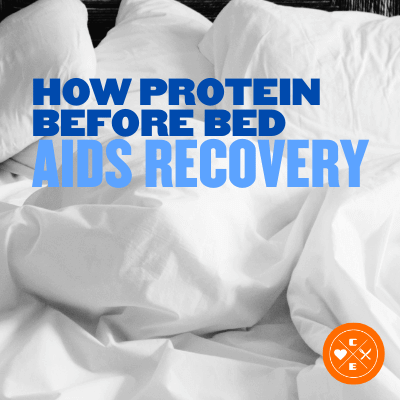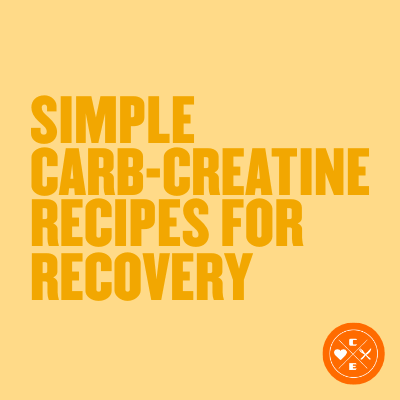How Protein Before Bed Aids Recovery

Jason Nista
Nutrition
01/03/2026 9:59am
11 minute read
Quick Summary: Eating 20-40 grams of slow-digesting protein like casein 30-60 minutes before bed supports overnight muscle repair, growth, and recovery. During sleep, your body actively rebuilds muscle tissue, and having amino acids available can increase muscle protein synthesis by up to 22%. Good pre-sleep options include Greek yogurt, cottage cheese, casein supplements, or high-protein meals from Clean Eatz Kitchen.
How Muscle Recovery Works During Sleep
When you sleep, your body shifts into repair mode, working hard to fix the tiny muscle tears caused by workouts and daily activities. This process depends heavily on having enough protein available to fuel recovery.
During deep sleep, your body releases growth hormone at its highest levels. This hormone plays a key role in repairing muscles, but it needs amino acids from protein to do its job effectively. While you rest, your muscles adapt to the stress they've endured, becoming stronger in the process. That's why quality sleep and proper nutrition are essential for turning your hard work at the gym into visible results. For a deeper dive into why sleep matters so much for your health and fitness goals, check out our comprehensive guide on the importance of sleep for overall health and well-being.
Sleep also creates a natural fasting window — those 7-9 hours when no new nutrients are coming in, but your body is still actively repairing. This is where eating the right type of protein before bed becomes a smart move.
Muscle Protein Synthesis Overnight
Muscle protein synthesis (MPS) is your body's way of building and repairing muscle fibers. Think of it like a construction crew working overtime to strengthen and rebuild your muscles. This process happens around the clock, but it's especially active during sleep, thanks to the release of growth hormone and other recovery-related hormones.
Research shows that MPS can stay elevated for up to 48 hours after a workout. During sleep, this process becomes even more efficient, provided your body has a steady supply of amino acids. By consuming slow-digesting proteins like casein before bed, you give your body a steady flow of amino acids for 6-8 hours. This prevents interruptions in MPS, keeping the recovery process on track.
Think of your muscles as 24/7 protein factories. During the day, they're busy meeting the demands of movement and activity. At night, they can focus entirely on repair — fixing damage, reinforcing weak spots, and building new muscle tissue. Without enough protein before bed, MPS can slow down significantly, meaning you miss out on prime recovery time when your body is most ready to rebuild.
Preventing Muscle Breakdown
Overnight fasting presents a challenge: without enough amino acids in your bloodstream, your body may start breaking down muscle tissue to fuel repair — a process known as muscle protein breakdown (MPB). While this might maintain your current muscle mass, it doesn't help you make progress. In fact, if you're not eating enough protein overall or are in a calorie deficit, you could even lose muscle mass during sleep.
This situation is made worse by the natural rise in cortisol, a stress hormone, during the early morning hours. Cortisol can promote muscle breakdown when amino acids are in short supply. Eating protein before bed helps counteract this by providing your body with the resources it needs, reducing the likelihood of muscle breakdown.
The ultimate goal is to achieve a positive net protein balance — building more muscle protein than you're breaking down. Even small gains in this balance over time can lead to noticeable improvements in muscle mass, strength, and recovery.
To reduce overnight muscle breakdown, consuming 20-40 grams of slow-digesting protein before bed can make a big difference. This helps create an ideal environment for recovery and ensures that your sleep works in favor of your fitness goals. Timing is important too — eating protein 30-60 minutes before bed allows your body to start breaking it down into amino acids, so they're ready to support recovery during the deeper stages of sleep.
Benefits of Eating Protein Before Bed
Adding protein to your nighttime routine can do more than just curb late-night cravings — it can actively support your body's recovery and performance goals. Here's how it helps:
Better Muscle Repair and Growth
Eating protein before bed provides your body with the tools it needs for overnight muscle repair. Slow-digesting proteins, like casein, deliver a steady stream of amino acids throughout the night. This consistent supply aids in repairing muscle tissue, promoting growth, and even optimizing fat metabolism. It's like giving your muscles an all-night maintenance crew.
Preserving Lean Mass for Fat Loss
When you're cutting calories, protecting your lean muscle is key to keeping your metabolism running smoothly. Protein before bed helps maintain muscle tissue while encouraging your body to burn fat for energy. By preserving lean mass, you support a more active metabolism, which not only aids in fat loss but also keeps you on track toward a healthier body composition. For more strategies on supporting your weight loss goals through exercise and nutrition, see our complete exercise guide for weight loss.
Enhanced Recovery and Performance
Nighttime protein isn't just about muscle — it helps repair cellular structures affected by intense workouts. This extended recovery window reduces muscle soreness, improves sleep quality, and leaves you feeling more prepared for your next session. It's a simple way to keep your training consistent and effective while supporting endurance and overall performance.
Best Protein Sources for Nighttime Recovery
Picking the right protein before bed can make a big difference in how well your muscles recover and grow overnight.
Slow-Digesting vs. Fast-Digesting Proteins
Not all proteins work the same way. Casein protein, for instance, is a slow-digesting option. It forms a gel in your stomach, which slows down its absorption. This steady release of amino acids provides your muscles with a continuous supply of nutrients while you sleep. On the other hand, whey protein is absorbed quickly, which means it might not keep your amino acid levels steady throughout the night — though recent research suggests both can be effective when consumed before bed.
Protein-Rich Meal and Snack Options
If you're looking for practical ways to boost your nighttime protein intake, a casein supplement is an easy and effective choice. It's designed to provide your body with the nutrients it needs while you rest.
Other options include snacks like Greek yogurt, cottage cheese, or even a glass of milk. These foods are naturally rich in casein and can help fuel overnight recovery.
Ultimately, the best protein source for you will depend on your dietary preferences and how your body responds. Try out different options to see what works best for your recovery goals.
Using Clean Eatz Kitchen for Convenient Nighttime Protein
Getting your protein fix before bed doesn't have to mean spending your evenings cooking. Clean Eatz Kitchen offers a hassle-free way to meet your nighttime nutrition goals with chef-prepared meals packed with the protein your muscles need to recover while you sleep. It's a simple, effective solution for maintaining a steady intake of quality protein overnight.
Chef-Prepared, High-Protein Meals
The High Protein Meal Plan from Clean Eatz Kitchen is built with muscle recovery in mind, offering meals that pack 35g or more of protein each. These flash-frozen, single-serving meals are ready to eat in under 5 minutes — no chopping, measuring, or cleanup required.
Some standout options from their High Protein Box include the XL 5-Cheese Chicken Parm (52g protein), XL BBQ Chicken Alfredo (46g protein), and XL A1 Beef Bowl (41g protein). These hearty meals deliver the kind of protein punch that helps fuel recovery throughout the night.
If you're looking for something lighter, their High Protein Overnight Oats are a perfect choice. With 20g of protein per serving, they come in flavors like Blueberry Muffin, Strawberries & Cream, and Cookies & Cream. At just $3.49 per serving, these oats are an affordable and easy way to get your protein without the heaviness of a full meal.
Nationwide Delivery and Flexible Options
Clean Eatz Kitchen makes it easy to stay on track with your nutrition, no matter your schedule. Their rotating monthly menu ensures variety, so you won't get stuck eating the same meals week after week. Plus, there's no subscription required — you can order whenever you need meals.
The pricing is straightforward and budget-friendly. Meals in the High Protein Meal Plan start at $9.99 each, while the High Protein Box (30 meals) is priced at $235.00, breaking down to just $7.83 per meal. That's not only cheaper than most restaurants but also delivers the kind of nutrition tailored to your recovery goals.
Whether you prefer hearty dinners or lighter, protein-packed snacks, Clean Eatz Kitchen has options to fit your pre-sleep routine. With nationwide delivery, you can rely on them to meet your nighttime protein needs — even on busy days or while traveling.
Practical Tips for Timing and Portion Sizes
To get the most out of your recovery, paying attention to when and how much protein you consume before bed can make a big difference. By fine-tuning your timing and portion sizes, you can keep a steady flow of amino acids working overnight to repair and rebuild muscle.
Best Timing for Pre-Sleep Protein
Aim to have your protein about 30-60 minutes before heading to bed. This timing ensures your body has the nutrients it needs right when it shifts into recovery mode during sleep. If you work out in the evening, try to sync your protein intake with your post-workout routine, but make sure it doesn't leave you feeling too full or uncomfortable as you wind down for the night.
Adjusting Portions Based on Individual Goals
Portion sizes aren't one-size-fits-all. They depend on factors like your body size, fitness goals, and how active you are. If building muscle is your main goal, you might need a larger serving (closer to 40g). On the other hand, if you're focusing on weight management, a moderate portion (around 20g) might be better. Start with a standard serving size, and tweak it based on how you feel — keep an eye on your sleep quality and energy levels as indicators.
Frequently Asked Questions
Why is casein protein a great choice before bed?
Casein protein digests slowly, forming a gel in your stomach that releases amino acids steadily over 6-8 hours. This sustained delivery supports muscle repair and recovery throughout the night, making it ideal for pre-sleep consumption. Research shows casein before bed can increase overnight muscle protein synthesis by approximately 22%.
How much protein should I eat before bed?
Research suggests consuming 20-40 grams of protein approximately 30-60 minutes before bed for optimal results. This amount provides sufficient amino acids to support overnight muscle protein synthesis without causing digestive discomfort that could disrupt sleep.
Can eating protein before bed help with weight management?
Yes, pre-sleep protein can support weight management by preserving lean muscle mass while encouraging fat metabolism. Protein also helps manage late-night hunger and reduces cravings. Choose portion-controlled, protein-rich options like Greek yogurt, cottage cheese, or a protein shake to support recovery without excess calories.
Does eating protein before bed affect sleep quality?
Light, easy-to-digest protein sources like Greek yogurt, cottage cheese, or a protein shake work well before bed without disrupting sleep. However, heavy or hard-to-digest proteins like large steaks can slow digestion and potentially cause discomfort. Stick to lighter options and avoid eating too much late at night.
What foods are good sources of protein before bed?
Excellent pre-sleep protein sources include casein protein supplements, Greek yogurt, cottage cheese, milk, and high-protein prepared meals. These foods are naturally rich in slow-digesting proteins that fuel overnight recovery. Choose options that are easy to digest and won't cause discomfort.
The Bottom Line
Including protein in your nighttime routine can be a smart move to support recovery and muscle repair. During sleep, your body focuses on rebuilding and repairing, and having a steady supply of amino acids helps muscle protein synthesis stay active throughout the night. This can lead to better muscle recovery, enhanced performance, and even help preserve lean mass, which supports fat loss.
The trick is choosing protein sources that work for you. Slow-digesting options like casein are popular, but even a protein-rich snack or meal can do the job. The most important factor is consistency. Aim to have your protein about 30-60 minutes before bed, and adjust the portion size to align with your goals and dietary needs.
For a no-fuss solution, Clean Eatz Kitchen offers chef-prepared, high-protein meals designed to make your pre-sleep nutrition simple. This hassle-free option ensures you're fueling your recovery without the need for extra cooking or planning.
Your recovery may take place while you sleep, but it starts with what you do before bed. By making protein a priority in those final hours of the day, you give your body the tools it needs to rebuild and come back stronger.
Related Articles
We Were on QVC! Meet Our 11g-Protein PB&J!
2 minute read
Best Allergy-Friendly Meal Delivery Services 2025
10 minute read
Simple Carb-Creatine Recipes for Recovery
12 minute read



